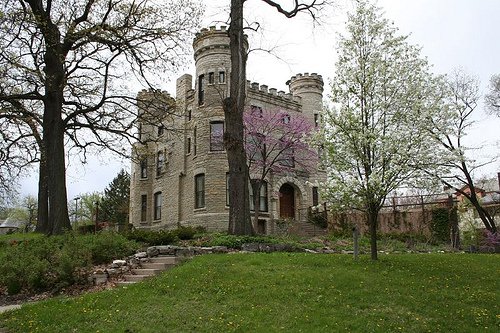Church Takes Down 'Black Lives Matter' Sign After Receiving Complaints
By aaroncynic in News on Sep 10, 2015 7:45PM

Via Facebook
According to CBS2, earlier this month Beverly Unitarian Church, also known as The Castle, posted “Black Lives Matter,” on its sign. For some in the predominantly white neighborhood—home to many city employees, including a large portion of police officers—that simple message was enough to elicit both racist rants and threatening messages:
“A terrorist organization matters? The chanting for cops deaths and so forth is godly like?” wrote one Facebook user on the church’s page.
“Nice that a church plays into the race card crap perpetuated by society and the media! Thank you for doing your part to support what is quickly becoming a terrorist movement and further segregating the American people!”
A photo of the sign went viral after Cydni Polk of Blue Island posted it with the caption “Why yes ... yes they do ..." with the hashtags #salute and #myhood. Yesterday, Polk told DNAinfo, “My mother still lives in the house we moved into when I was 3. Though I cannot remember experiencing racism personally within the borders of the community, I also can't remember there being a focus on diversity or cultural sensitivity.”
Alderman Matt O’Shea said that he wasn’t surprised, given the number of city employees, particularly police officers, who live in the neighborhood. But after the torrent of racist remarks and some unspecified threats, he reached out to minister Reverend Karen Mooney, to offer any help he could. "It's very few people that I even recognize from the neighborhood,” O’Shea told DNAinfo.
Beverly has had problem with white supremacists in the past. One Beverly man put up a "white power" yard sign in 2010. In 2011, three white teens put a noose around the neck of a black teen, yelled racist epithets at him and threatened to kill him. And swastikas appeared on the trash cans of Beverly neighbors earlier this year.
The #BlackLivesMatter movement has helped to make the shooting of hundreds of unarmed people of color national news. But the church ultimately changed the sign to read “Life Matters, Risk loving everyone.” In a statement—since edited—on its Facebook page, the Church described why they decided to take the message down:
“Since this posting we have been made aware that there is a movement associated with these words that has been accused of being anti-white, anti-police, and a terrorist group...A message left on our answering machine, asking us to think about how these words make a police officer feel, gave us the most pause...We had no intention of aligning ourselves to a specific organization that is maligning people who offer us security - AND we still believe the premise of this statement.”
Not everyone, including Unitarian members, were happy with the church's decision, and they expressed their frustration on Facebook with statements like these:
"Please don't. Please. To change your sign to pacify those who choose not to analyze their own feelings, to change it for those who read their own twisted thoughts in to what is, ultimately, a message of unity is just pandering. No change is possible without taking a stand. Please keep the sign as is. WE ARE WITH YOU."
"As a Unitarian Universalist seminarian and a member of the First Unitarian Society of Denver, I am disappointed in this congregation's conciliatory response to racist trolling. Our General Assembly this year agreed on national support of the #blacklivesmatter movement. We have had these conversations for over a year in many congregations, and this feels like a giant step backward. If we can't even specifically say that black lives matter out loud and in print, how can we possibly say we don't think black people are "less than"?"
If "Black Lives Matter" is truly a controversial statement, maybe we should all just pack it in. What do we as a religious community have to say if we can't even stand behind that?
In its last post on the issue, the church said it’s made an effort to listen to all the responses and posed a question: “For too long being black has meant being less than; how do we change this in our community?”